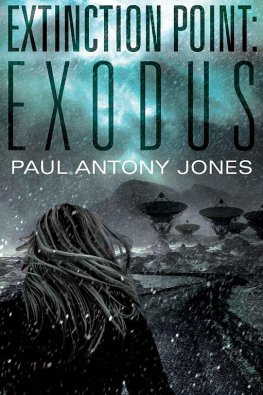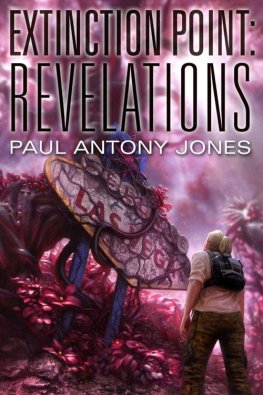Paul Antony Jones
EXTINCTION POINT:
EXODUS
For Jeff Wayne and Herbert George Wells Thank you for fueling the fire of my imagination


Commander Fiona Mulligan had made a habit out of watching the sunrise.
Of course, when you were on board a two-hundred-and-forty-foot-long hunk of metal, hurtling along at just over seventeen thousand miles per hour in a low orbit above the earth and completing almost sixteen revolutions of the earth a day, you got to see a lot of sunrises.
The longest most crew members of the International Space Station got to sleep at any one time was about six hours; couple that with the disorienting effect of waking surrounded by darkness after one period, then sunlight the next, and it could play havoc with your biological clock. Fiona had found a simple solution, though; whenever the opportunity presented itself, she would try to time the end of each sleep period to coincide with one of those sunrises.
Dawns aboard the ISS were a very different affair from those the billions of souls on the gleaming blue planet beneath her feet experienced. Most earthbound sunrises could be obscured by clouds and smog and cityscapes, obfuscating the simple wonder of watching the birth of a new day. By contrast, the little market town of Dorking, in the UK where she had grown up, had given her an exemplary view of the heavens and fueled her love of space when she was just a child. But even those misty mornings and ebony nights of her childhood paled by comparison to the godlike perspective afforded her and the ISS crew, so many miles above the earth. Up here, they were simply glorious.
Watching from the cupola of Tranquility (Node 3), a room-size cylinder jutting out from just below (or above, depending on the stations orientation at any given moment) the US laboratory Destiny, Fiona could see the lights of cities moving slowly by through the darkness beneath her. In the distance the faint glow of the rapidly approaching morning cut a laser-sharp crescent against the arch of the earth. Slowly, it expanded into a thin band of spectral blues and yellows and began to creep from the horizon across the curvature of the earth toward the station, revealing clouds floating above a blue sea and the far-off coastlines of islands and the undulating curve of the continent of Africa.
An aurora of surging light painted broad strokes of turquoise over the South Pole as the sun emerged, rising sideways like an ancient phoenix from the blackness of space. It pushed back the shadows enveloping her world, until finally the planets home star appeared in all its glory, welcomed by the gentle whirring vibration of the stations solar panels as they gradually oriented themselves to collect its life-giving energy.
According to the stations telemetry system, they were currently over the South Atlantic Ocean, rapidly heading toward Namibia. They would pass across that massive continent that had given birth to humanity, skirting Europe, and then onward over central Russia.
She had seen many sunrises during her two-month stay on the station. Each one was different in its own way, depending on the orientation and position of the station over the surface of the earth.
Sunrise the day the world ended was different for another reason.
At first, Commander Mulligan thought the anomaly was some kind of optical illusion; a refraction of light off the low-lying clouds that blanketed most of the view below them, or maybe it was some kind of visual artifact of the aurora borealis that still flickered and played far to the north. But as she continued to focus on the unusual phenomenon stretching out far below, Fiona realized this was something else altogether, something quite extraordinary.
Trailing behind the rapidly advancing dawn was a scintillating ribbon of red that began as a barely distinguishable needle-thin line south of her position toward Indonesia and extended over the horizon toward Finland. As she followed the ribbon north, she could see it was gradually expanding in width. By the time it passed over the equator, it had grown to a thick band of crimson. Fiona estimated it was at least thirty miles wide at its broadest point, from leading edge to trailing edge. As it passed over the Tropic of Capricorn, she could see the crimson line begin to taper off again before it became nothing but a slight thread in the distance and then disappeared completely a few miles short of the Arctic Ocean.
She had immediately reported the strange event to mission control while relaying the stations incredible images back to the agency as the ISS swept over the phenomenon, continuing along its orbit.
No one seemed to have any idea what it was she was seeing. The ribbon of red appeared to be moving in an almost regimented progression across the globe. Scientists on the ground and in the ISS postulated that it might be some kind of freak weather event, or maybe the smoke from an unobserved undersea volcanic eruption. But if either of those theories were correct, then surely there would have been some kind of disruption to the consistency of the ribbon, just as a contrail of a high-altitude aircraft will slowly lose its coherence. It stood to reason that whatever this event was, over time it should begin to dissolve, pulled away by winds and disruptive weather patterns. But there was no loss of cohesion; its edges had remained sharply defined as it swept methodically onward across the globe.
And whatever this stuff was made of, it was sufficiently dense that it was impossible to see through to the sea beyond. She watched as it completely obscured a small black dot that was probably a supertanker plying its way between countries. The tanker disappeared as the red streamer passed over it before reappearing on the opposite side and continuing on its way to wherever it was bound. It seemed unharmed, and there was no sign that it had changed course or even seen the red band that it had passed directly beneath.
It was difficult to say just how high above the surface this strange red anomaly was, but judging by the ships unaltered course, the captain either hadnt considered it a threat or hadnt had time to make any evasive maneuvers. Not that it would have helped; the ribbon seemed to be spread almost completely across the globe.
The observation port of the cupola of Tranquility had the best view of the ongoing event, but it was too cramped to comfortably fit any more than two observers at once. Each member of the crew joined the commander in turn to watch the slowly advancing ribbon and offer up his or her opinions and theories.
It was Ivan Krikalev, the teams resident flight surgeon as well as a highly competent engineer, who finally voiced what everyone else had been thinking. Perhaps it is some kind of alien life-form, he whispered as he floated next to Fiona, watching through the observation port next to hers.
What? she said, not sure she had heard him correctly.
The implacable Russian slowly rotated to face her. I said, perhaps it is alien in origin. The theory of panspermia is an accepted possibility of how life began on earth. Maybe what we are observing is an example of that theory in action. Who knows for certain? I have no other suggestions.
Fiona vaguely remembered watching a documentary on the Discovery Channel at some point that briefly covered the theory behind the unproven hypothesis. Isnt that the idea that life on earth originally came from outer space?
You are basically correct, said Krikalev. The theory is more complex than that, of course, but it has been around since the fifth century. It is all mainly conjecture, of courselife is transferred from planet to planet by microorganisms trapped in meteors or blown on the solar winds, just like pollen travels on the wind. There are many theories, but, in the end, it boils down to life being seeded throughout the galaxy. Perhaps we are quiet witnesses to one of those very events.














